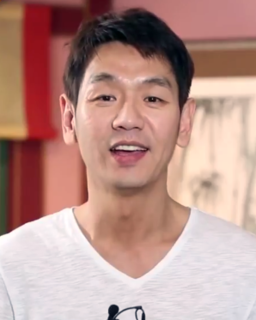See also
| This page or section lists people that share the same given name. If an internal link led you here, you may wish to change that link to point directly to the intended article. |
| Tae-woo | |
| Hangul | 태우 |
|---|---|
| Hanja | |
| Revised Romanization | Tae-u |
| McCune–Reischauer | T'ae'u |
Tae-woo is a Korean male given name.
People with this name include:
| This page or section lists people that share the same given name. If an internal link led you here, you may wish to change that link to point directly to the intended article. |

Choi is a common Korean family name. As of the South Korean census of 2015, there were 2,333,927 people by this name in South Korea or roughly 4.7% of the population. In English-speaking countries, it is most often anglicized Choi, and sometimes also Chey, Choe or Chwe. Ethnic Koreans in the former USSR prefer the form Tsoi (Tsoy) especially as a transcription of the Cyrillic Цой.

Jeong is a Latin alphabet rendition of the Korean family name "정", also often spelled Chung, Jung or Jong. As of the South Korean census of 2015, there were 2,407,601 people by this name in South Korea or 4.84% of the population. The Korean family name "정" is mainly derived from three homophonous hanja. 鄭 (2,151,879), 丁 (243,803) and 程 (11,683). The rest of the homophonous hanjas include: 政 (139), 桯 (41), 定 (29), 正 (22) and 情 (5).
Kim Tae-woo may refer to:
Kim Tae-Woo is a retired South Korean freestyle wrestler, four-time Olympian and Olympic Bronze Medalist. Kim represented South Korea for 15 years in freestyle wrestling and is considered the greatest South Korean heavyweight wrestler of all time.
Hyun-woo, also spelled Hyeon-woo, is a Korean masculine given name. The meaning differs based on the hanja used to write each syllable of the name. There are 42 hanja with the reading "hyun" and 60 hanja with the reading "woo" on the South Korean government's official list of hanja which may be registered for use in given names. Hyun-woo has been a popular name for baby boys in South Korea for more than two decades, coming in third place in 1988 and fourth place in 1998. In 2008, a total of 1,943 baby boys were given this name, making it the third-most popular name that year.
Woo-jin is a Korean unisex given name. Its meaning differs based on the hanja used to write each syllable of the given name. There are 41 hanja with the reading "woo" and 43 hanja with the reading "jin" on the South Korean government's official list of hanja which may be registered for use in given names. In 2008, Woo-jin was the fifth-most popular name for baby boys in South Korea, with 1,811 being given the name that year.
Min-ho is a Korean masculine given name. The meaning differs based on the hanja used to write each syllable of the name. There are 27 hanja with the reading "min" and 49 hanja with the reading "ho" on the South Korean government's official list of hanja which may be used in given names. Min-ho was the ninth-most popular name for South Korean baby boys in 1980.
Sun-woo, also spelled Seon-u, Sŏn-u, or Seon-woo, is a Korean surname and unisex given name. It may also be written without the hyphen after the 'n', particularly when used as a surname.

Kim Tae-woo is a South Korean actor. After his breakthrough in blockbuster war film Joint Security Area, Kim became best known for his leading roles in arthouse films, such as those directed by Hong Sang-soo, namely Woman Is the Future of Man, Woman on the Beach, and Like You Know It All.
Tae-young is a Korean unisex given name. Its meaning differs based on the hanja used to write each syllable of the name. There are 20 hanja with the reading "tae" and 34 hanja with the reading "young" on the South Korean government's official list of hanja which may be registered for use in given names.
Tae-yeon is a Korean unisex given name. Its meaning differs based on the hanja used to write each syllable of the name.
Events from the year 1992 in South Korea.
Events from the year 1980 in South Korea.
Mystic Story (Korean: 미스틱스토리) is a South Korean entertainment company established by South Korean singer-songwriter Yoon Jong-shin. It has four subsidiaries, including Mystic Actors, which manages actors and actresses.
Woo, also spelled Wu or Wo, Ou, U, is an uncommon Korean surname, a single-syllable Korean given name, and an element in many two-syllable Korean given names. As given name meaning differs based on the hanja used to write it. There are 60 hanja with the reading "woo" on the South Korean government's official list of hanja which may be registered for use in given names.
Jin-woo is a Korean masculine given name. Its meaning differs based on the hanja used to write each syllable of the name.
Dae-hyun is a Korean masculine given name. Its meaning differs based on the hanja used to write each syllable of the name. There are 17 hanja with the reading "dae" and 35 hanja with the reading "hyun" on the South Korean government's official list of hanja which may be registered for use in given names.
Won is a single-syllable Korean given name, and an element in many two-syllable Korean given names. Its meaning differs based on the hanja used to write it. There are 46 Hanja with the reading "won" on the South Korean government's official list of hanja which may be registered for use in given names.